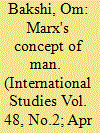|
|
|
Sort Order |
|
|
|
Items / Page
|
|
|
|
|
|
|
| Srl | Item |
| 1 |
ID:
141746


|
|
|
|
|
| Summary/Abstract |
This article explores an under-investigated policy tool for bringing about the transformation of foreign regimes. This policy—which we dub coercion demanding regime change (CDRC)—uses coercive threats to persuade autocratic rulers to relinquish power and step down. We provide an initial guide for how to optimally design CDRC policies and when to use it. Our recommendations are based on an analysis of autocratic rulers’ expected response in the face of CDRC threats. This analysis integrates a rational calculus with dictators’ common psychological traits. Finally, we identify several tactics dictators commonly use to counter coercive pressures and possible risks coercing powers should be aware of when pursuing CDRC.
|
|
|
|
|
|
|
|
|
|
|
|
|
|
|
|
| 2 |
ID:
117568


|
|
|
|
|
| Publication |
2011.
|
| Summary/Abstract |
For long, the feeling has been that Marx views man essentially in terms of his material interests. The publication of Economic and Philosophical Manuscripts, however, has led many to realize that he is keenly interested in developing individual potentialities, realizing 'human essence' and nurturing talents. What is interesting, however, is that Marx relies on productive activity, on labour, to give meaning to life. How work in factories, however rationally organized, can be a source of joy and fulfilment is hard to see. It is, therefore, not surprising that when he touches upon these issues in later writings, few though these occasions are, he relies more on intellectual, literary and artistic pursuits than on labour. No matter which activity we pursue, however, we can profitably pursue it, says Marx, only in a communist society. Thus, he attaches great importance to reorganizing the economic aspect of society. But strangely he does not think that bringing about these changes, building a better society, would give meaning to life. In any case, Marx's plea to develop potentialities, realize 'human essence' and foster creativity did not have much relevance for societies characterized by poverty, privation and exploitation that existed in his time. It is, therefore, not surprising that in his later writings he is concerned more about the problems facing society, especially the miserable condition of workers. This leads him to make a careful analysis of the existing reality. Those interested in the study of politics and society today, especially in countries like India, which are facing major problems, need to pay more attention to the approach Marx adopts in his later writings.
|
|
|
|
|
|
|
|
|
|
|
|
|
|
|
|
|
|
|
|
|